Let’s face it: college can be expensive.
Sure, you can do lots of things to make it cost less, including applying for scholarships. But this doesn’t change the fact that sometimes college costs more than you can afford.
A common solution to this problem is to take out student loans. And as long as you don’t borrow more than you can afford to pay back, student loans can be a good choice.
But did you know that there’s another option for making college even cheaper?
It’s called the College Level Examination Program (CLEP), which is a series of examinations that you can use to get credit for college courses.
In this article, we’re going to take a look at what the CLEP program is, and how it can help you get your degree faster while saving you thousands in college costs. We’ll also address some common questions students have about the CLEP program.
What Is CLEP?
CLEP stands for “College Level Examination Program.” It’s a set of tests developed and administered by the College Board.
You probably know the College Board if you’ve taken the SAT or AP Exams.
But you may not have heard of CLEP. If you’re still in high school, this is understandable, as the CLEP tests are aimed at working adults who want to get a degree.
So what exactly are the CLEP tests? They’re exams that test your knowledge of a variety of academic subjects. Many colleges and universities will give you credit towards a degree for each CLEP test you pass. (Though it depends on the college and your major, as we’ll discuss below).
CLEP exams are divided into 5 main subject areas:
- Composition and Literature
- World Languages
- History and Social Sciences
- Science and Mathematics
- Business
Within each subject area, you can take the following exams:
Composition and Literature
- American Literature
- Analyzing and Interpreting Literature
- College Composition
- College Composition Modular
- English Literature
- Humanities
World Languages
- French Language: Levels 1 and 2
- German Language: Levels 1 and 2
- Spanish Language: Levels 1 and 2
History and Social Sciences
- American Government
- History of the United States I
- History of the United States II
- Human Growth and Development
- Introduction to Educational Psychology
- Introductory Psychology
- Introductory Sociology
- Principles of Macroeconomics
- Principles of Microeconomics
- Social Sciences and History
- Western Civilization I: Ancient Near East to 1648
- Western Civilization II: 1648 to the Present
Science and Mathematics
- Biology
- Calculus
- Chemistry
- College Algebra
- College Mathematics
- Natural Sciences
- Precalculus
Business
- Financial Accounting
- Information Systems
- Introductory Business Law
- Principles of Management
- Principles of Marketing
Why Take CLEP Exams?

So what’s the advantage of taking CLEP tests as opposed to a full college course? There are two main advantages:
- Cost
- Time
1. CLEP Exams Save You Money
Starting with the cost, CLEP exams are much cheaper than a full college course. Each exam costs $87 (plus an administrative fee of around $25 generally charged by the testing center).
Considering that the average cost per credit hour is $325 at a public university, CLEP exams can save you a lot of money.
Each test has a study guide that costs around $10, or you can get a study guide for all 33 subject areas for $25. You can also find the prep books for free at your local library.
Even if you took all 33 CLEP tests, it would only cost you $3,696 (this assumes a $25 administrative fee for each test, just to be safe).
This is a significant savings compared to tuition for even one semester at a 4-year public university, which averages $4,705.
In practice, of course, you would never take all the CLEP tests. But the fact remains that they can save you a lot of money.
2. CLEP Exams Save You Time
Money is a valuable resource, but time is even more valuable. CLEP tests can help you get a degree much faster than the traditional college path.
The conventional amount of time to get an undergraduate degree is 4 years, though it can take many students as long as six years.
If you just need a degree to get a better job, then 4–6 years is much too long to wait. With the right CLEP tests and undergraduate program, you could get your degree in as little as a year (or even less).
How to Use CLEP Exams to Get College Credit
Now that you understand the benefits of the CLEP program, let’s get into the details of how to use it to earn college credit. This process has several steps:
- Find a University That Accepts CLEP
- Plan Your Courses
- Prep for the CLEP Exams
- Schedule and Take Your CLEP Exams
- Transfer Your CLEP Credits
- Earn Your Degree
Let’s take a look at each of these in turn.
1. Find a University That Accepts CLEP
This is a crucial first step. There’s no point in taking CLEP tests if you can’t transfer your passing scores for credit. After all, the goal here is to get your degree ASAP, not to get bogged down in the individual details of the tests themselves.
Therefore, you need to find a university that will let you use CLEP tests to skip as much course work as possible. The best way to do this is to perform a quick google search.
For instance, let’s say that I’m looking for colleges that accept CLEP credit in my home city of Nashville. All I have to do is google “colleges that accept CLEP Nashville.” Here’s the result I get:
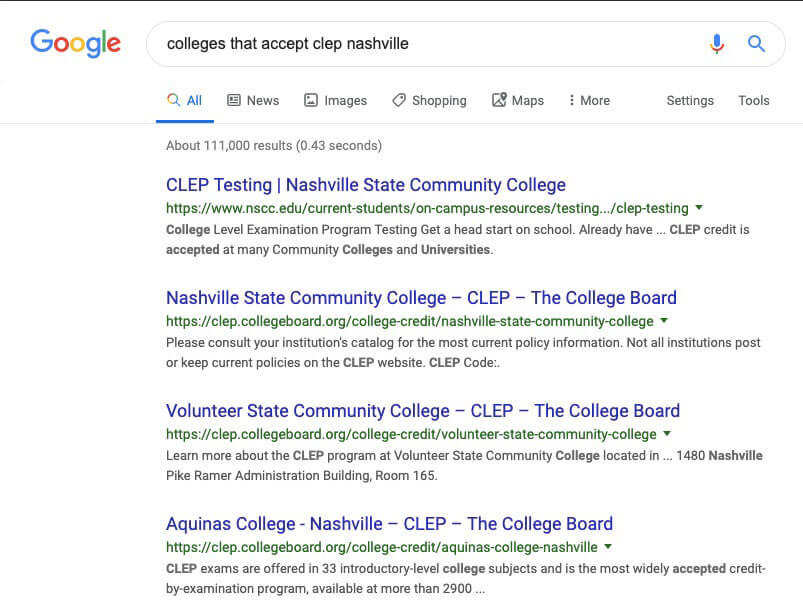
As you can see, it appears there are several colleges right in my city that will accept CLEP credit.
Once you’ve found a few schools that appear to accept CLEP, your next step is to examine their websites in more detail to find out what their exact policies are.
After that, you should contact the person at the college who handles transfer credits or non-traditional students.
It’s crucial to make contact with a real person, as the information on the university’s website may not always be up to date.
Having a real contact on the ground can also help you with any questions or issues that may come up in the process of transferring your CLEP credits.
2. Plan Your Courses
Planning your coursework is an essential step for any college student, but it’s especially important if you’re going to use CLEP tests to skip certain courses.
To start, you’ll need to decide on a major. Choosing a major is a whole different topic, but if your overall goal is just to get an undergraduate degree in something, then we recommend picking a subject that won’t require lots of lab or field work.
Degrees with lots of “practical” components will require you to spend more time at the university, making them more difficult to expedite using CLEP tests.
Using the information on the website of the university where you want to transfer your credits, you should now plan out which CLEP tests you’ll need to take.
Also, make note of the courses that you can’t skip and will have to take online or in person. This way, you don’t get the unpleasant surprise of learning that you need to take two more semesters of coursework when you thought you were ready to graduate.
Once you’ve figured out the above, make a list of the CLEP tests you’ll need to pass. Put the cost next to each, and then add up those costs plus the costs of administrative fees and additional courses you’ll need to finish your degree. This will give you a comprehensive cost for your degree.
You may be a bit surprised by how much it costs, but remember that you don’t have to come up with this money all at once.
You can pay for each CLEP test as you take it, and in the meantime you can save the larger sums you’ll need to pay for the university courses. If saving that much money sounds daunting, check out our budgeting guide for some savings tips.
3. Prep for the CLEP Exams
Taking tests can really suck, especially if you’ve been out of school for a few years. But luckily, there are lots of resources to help you pass the CLEP exams.
Remember that the key word here is pass. As long as it’s high enough to meet the university’s standards, your specific score doesn’t matter. It won’t affect your final GPA or be reflected on your transcript. From a practical perspective, a passing score on a CLEP exam is the same as a perfect score.
To study for each exam, you should first get the official study guide that the College Board offers. You can buy these books on the College Board website for a small fee, or you can find them for free at your local public library.
Be sure to take the included practice tests, as they’ll help you assess what you need to study further.
While the official prep books are the best place to start your studies, you don’t have to stop there. You should consult any relevant resources for the subject that the test covers. Here are a few of our favorites:
- Online tools – Let’s say you’re trying to pass the College Algebra CLEP exam. You could use a tool like Brilliant or Khan Academy to get a better understanding of the concepts (and practice them, too).
- Crash Course – This is a fairly specific recommendation, but it can be a lifesaver for typically “boring” subjects like economics, history, or chemistry. Each Crash Course video series is taught by an expert in a fun, informative style accompanied by delightful animations and concise explanations.
- Friends and family – Have a friend who’s a math whiz? See if you can get them to tutor you in exchange for lunch, coffee, or whatever arrangement makes sense.
- Modern States – Want at bit more guidance? Modern States offers free online courses to prepare you to pass CLEP and AP Exams.
4. Schedule Your CLEP Exams
Okay, so you’ve studied hard and you’re ready to take the test. Your next step is to schedule the exam.
To do this, you’ll first need to find a local CLEP testing center. Luckily, the College Board has a tool on their website that will help you find a testing center based on your location.
To use this tool, visit the Find a Test Center page . Once you’re there, you’ll see a form like the one below:
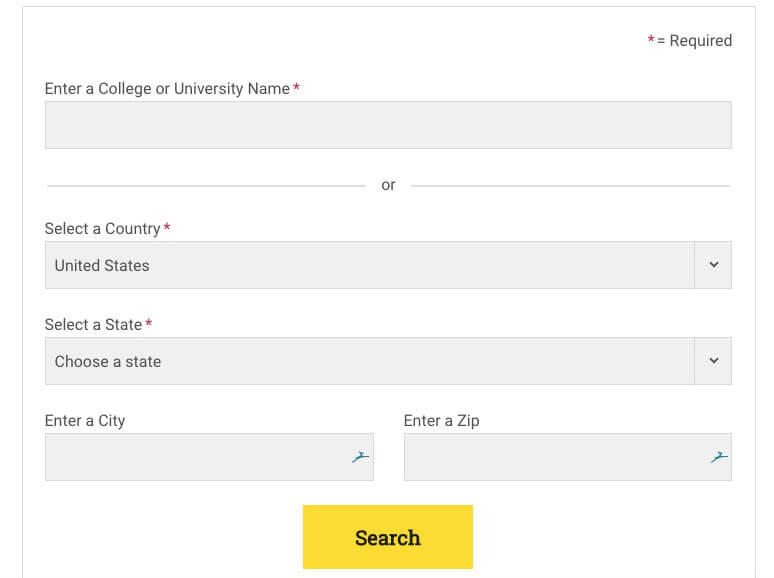
To find a test center, enter your country, state, city, and zip code (the last two are optional, but they’ll help make your search more precise). You can also specify a search radius, which is 25 miles by default:
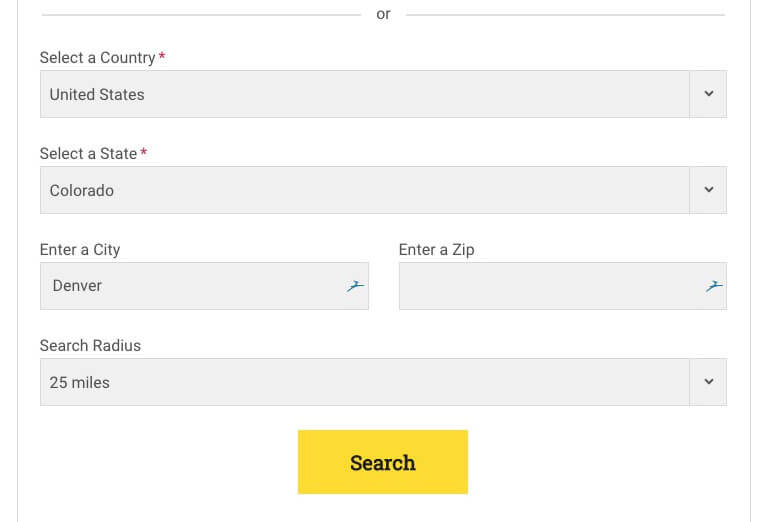
Once you’ve done that, hit “Search.” You’ll then be able to see a list of test centers in your area:
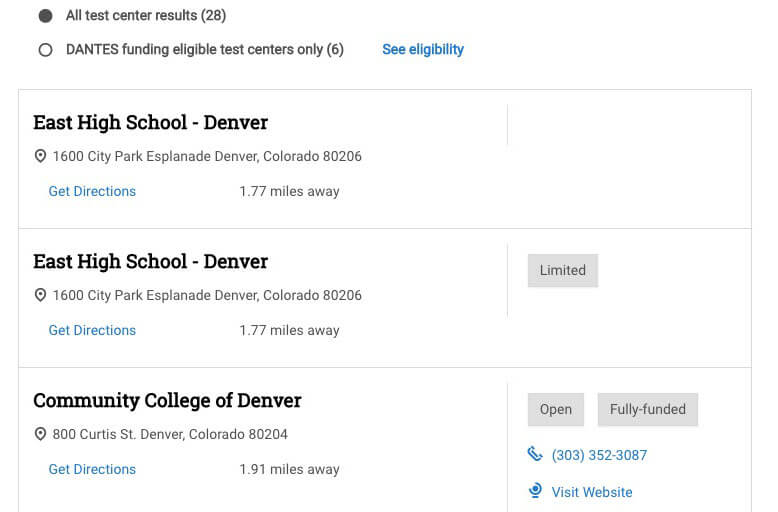
Along with the name and location of each testing center, you’ll also see information about the accessibility of the test centers:
- Test centers may be marked “Open,” which means that anyone who has registered for a test can take it there.
- Others are marked “Limited,” which means that only students enrolled at the institution can take CLEP tests there. This is often the case with high schools.
- Finally, you may see some centers marked “Fully-funded,” which means that eligible U.S. military service members can take CLEP tests there without having to pay an administrative fee. Indeed, military members can often take CLEP tests completely for free, as we’ll cover in a later section.
Once you’ve found a testing center you like, you need to register for and schedule the exam.
This part is a bit confusing, as it requires you to first register for the exam on the College Board website and then contact your preferred testing center to set up a date for you to take the test.
To register for the exam, visit this page and select the exam(s) you want to register for:
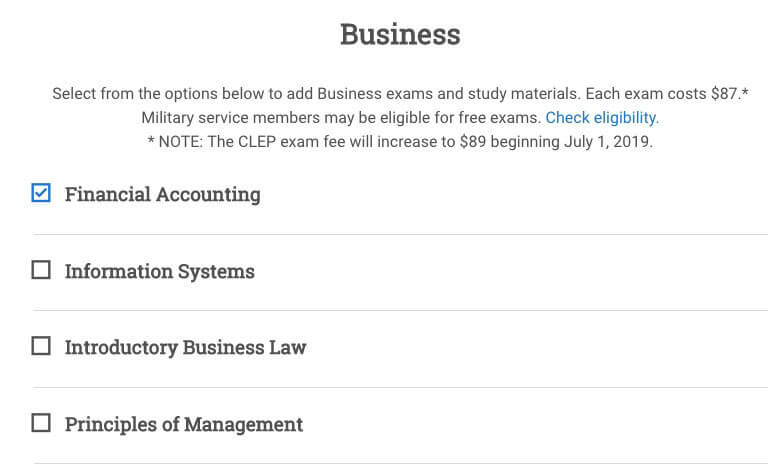
Once you’ve made your selections, click “Add to Cart”:
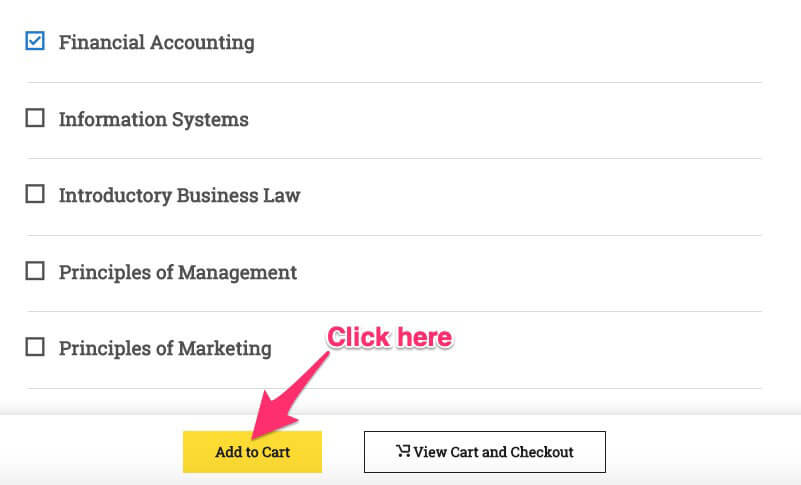
Click “View Cart and Checkout” when you’re ready to pay:
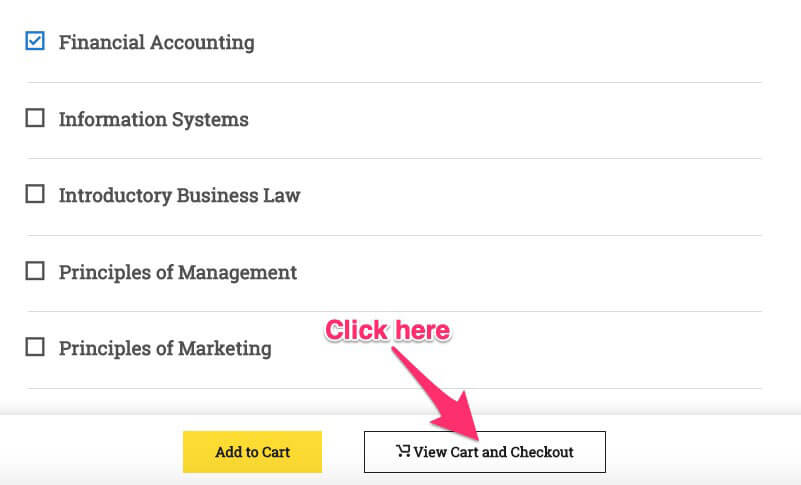
From this page, click on “Register and Checkout”:
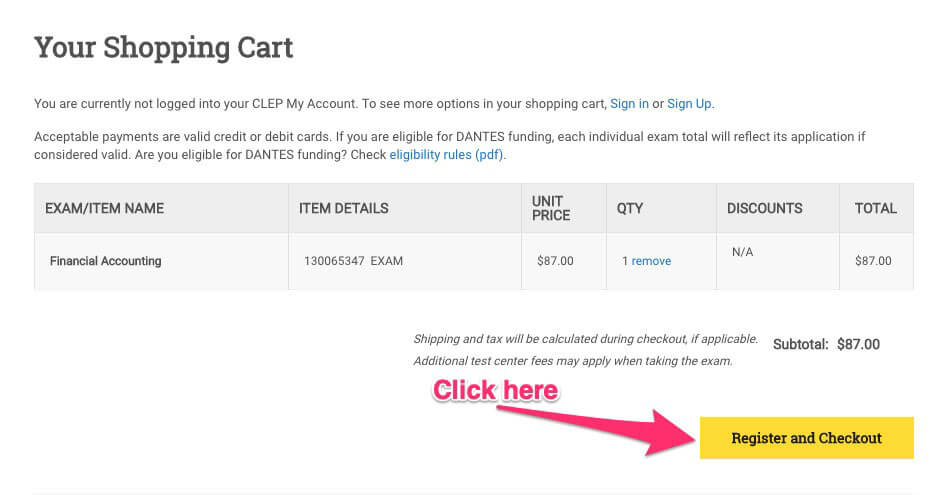
The site will then prompt you to sign in. If you don’t have a College Board account, you’ll need to create one. You can do this by clicking where it says “Sign Up”:
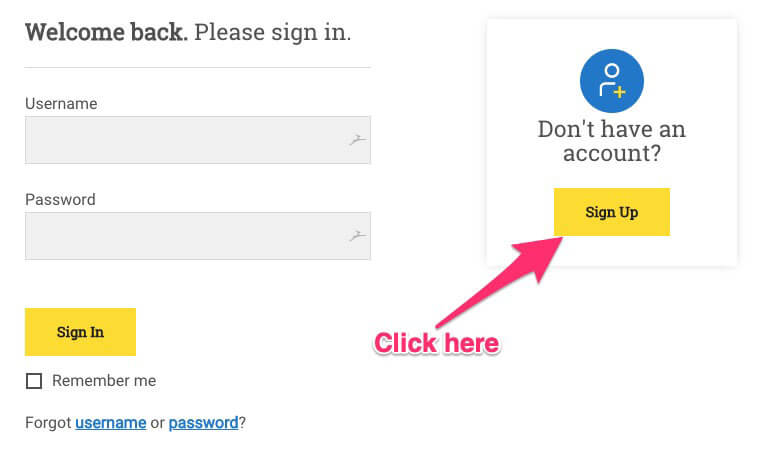
After you’ve signed in, you’ll need to pay for the exams. You can do this using any major credit or debit card.
Congrats! You’ve registered for the tests. Now, you need to contact the testing center to schedule them.
You can find contact info for the testing center you want to use back on the list of testing centers we looked at earlier. Many testing centers will let you register online, though some may require you to register over the phone.
5. Take Your CLEP Exams
With the exams scheduled and your studying complete, you’ve now reached the critical moment: exam day. Here’s what you can expect when you show up to the test center:
- You’ll take the exam on a computer.
- Each exam typically takes 90–120 minutes.
- Be sure to print your registration ticket from within your College Board account.
- Also, make sure to bring government-issued identification that includes your photograph and signature. Typically, this will be either your driver’s license or passport, though military ID, green cards, and other forms of ID may be acceptable. You can view a full list of acceptable IDs here.
- You’ll be able to view your score instantly, unless you’re taking an exam that includes a writing portion, such as College Composition. Scores for exams with writing portions will be available within 2–3 weeks.
To ensure that you do well on the test, get plenty of sleep the night before. Don’t stay up late to cram — it doesn’t work. For more info on effective test-taking, check out our massive collection of study information.
6. Transfer Your CLEP Credits
Assuming you passed the test, now it’s time to transfer your credits to the institution of your choice.
Ideally, you’ll know which institution you want to send your scores to before you register for the exam.
This is beneficial because each exam you register for includes one free “score send.” That is, when you register for a CLEP exam, you can choose the institution that you want to receive your score. You’ll see this option during the registration process, which we discuss above.
If you want to send your scores after you take the exam, or you want to send your scores to more than one institution, you can do so for an additional $20 (per transcript you order).
You’ll need to sign in to your College Board account, and then click the “Request a Transcript” button under the “My CLEP Account” dropdown menu.
A few important notes on transferring credits:
- Different institutions will have different minimum scores required to receive credit for each exam. You can generally find this information on the college/university’s website. You can also get this info directly from the person in charge of transfer admissions.
- To order a transcript for a CLEP exam funded by DANTES, you’ll need to use the Parchment Transcript Ordering Service. You cannot use your College Board account.
7. Earn Your Degree
If you’ve made it this far (both in the article and in the process), congrats! You’re well on your way to earning your degree.
To reiterate, make sure to check with your college/university about all the requirements for earning your degree.
CLEP exams will help you expedite the process, but there will still be a few courses that you need to take either online or in-person. Be sure to review the degree requirements closely.
CLEP Exams FAQ
This section includes answers to some common questions about CLEP exams. Feel free to come back to this section as questions arise.
1. What is DANTES?
DANTES stands for “Defense Activity for Non-Traditional Education Support.”
This is a program that allows eligible military personnel (as well as eligible spouses and civil service employees) to take CLEP exams for free or at a reduced cost.
You’ll also be able to receive a free study guide for each exam that you register for.
Eligible persons include:
- Military personnel:
- Army
- Navy
- Marine Corps
- U.S. Coast Guard
- Army Reserve
- Air Force Reserve
- Marine Corps Reserve
- Navy Reserve
- Coast Guard Reserve
- Air National Guard
- Spouses of Coast Guard (active and reserve)
- Civilian employees of Air Force
Generally, you’ll need to take your CLEP exams at either a military base or fully-funded test center in order to get all the fees (including administrative fees) waived.
To find a fully-funded test center near you, look for the “Fully funded” tag next to test center names.
See the image below for an example:
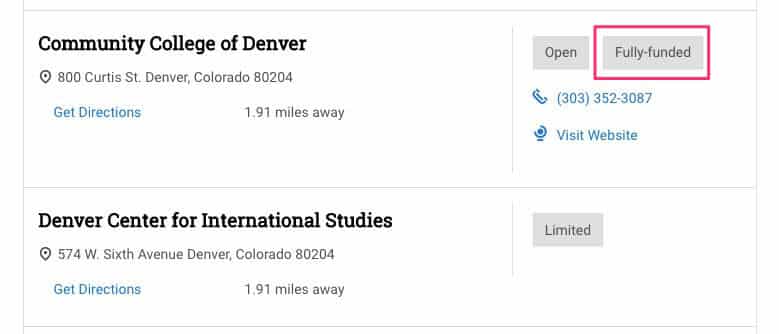
To learn more about DANTES, visit the College Board’s Military Benefits page.
3. What’s the difference between AP and CLEP?
AP stands for “Advanced Placement.” It’s a program that aims to help high students take college-level courses while still in high school.
The goal is to help students be better prepared for college, skip introductory college classes, or even earn college credit if the university allows it.
Generally, your high school will offer courses specifically to prepare you to take the AP Exam.
It is possible to take the exams without taking the accompanying course, though this isn’t common. AP Exams are only offered once a year in May.
CLEP, in contrast, is aimed more at working professionals looking to get a degree. CLEP exams are offered year-round at a variety of locations.
4. Can I take CLEP tests while I’m in high school?
Sure! As long as you can pay the fee and attend the examination, you can take it.
If you’re interested in earning college credit while in high school, we also recommend seeing if your school offers dual enrollment (a way to take college courses for free at a local university or community college).
5. How do I contact CLEP?
You can call CLEP at 800-257-9558 (212-237-1331 if you’re outside of the U.S.).
You can also email them at [email protected].
6. What schools take CLEP?
There are over 2,900 colleges and universities that will give you credit for CLEP tests.
Your best bet is to look at which local colleges and universities will give you credit, as attending in-state schools tends to be cheapest.
7. Do CLEP exams count towards your GPA?
No, they do not. As long as you get the minimum score that your institution requires, you will receive course credit. And remember: your GPA is not the most important thing when it comes to getting a job.
8. Can you CLEP your way to a degree?
Yes, it is possible, though passing CLEP exams will not get you a degree by itself.
To get a degree, you need to find a university that will allow you to transfer the credits you earn through CLEP tests.
You’ll then need to pay the necessary fees to enroll as a student at that university and get your credits transferred. Once you do this, you can then graduate from the university and receive your degree.
If you’re looking for an accredited university that will let you do this, a popular option is Excelsior University. They don’t have residency requirements for receiving degrees, and they let you transfer up to 117 credits.
You’ll still have to take a 3-credit capstone course and a 1-credit information literacy course before they’ll grant you a degree (their generic “Liberal Arts” degree). But the savings of this are still massive compared to getting a regular degree.
Of course, Excelsior is just one example. Lots of state universities will let you do something similar, and you can even take all your required courses online so that you don’t have to commute.
9. How many CLEP credits are accepted?
This depends on the university and the degree program. In theory, you could use CLEP exams to get almost all the required credits for your degree.
A more realistic scenario would be using them to skip all your general education courses, meaning you could spend your time taking classes in your major. This could easily let you get your degree in half the time.
10. How many credits are CLEP tests worth?
This is ultimately up to the university you transfer them to, but a passing score on a CLEP exam is generally worth between 3 and 6 credit hours.
11. How much do CLEP exams cost?
Each exam costs $87, regardless of subject. In addition, most CLEP test centers charge a $25 administrative fee.
12. Can you retake a CLEP test?
You can take CLEP tests as many times as you want (though you’ll have to pay the $87 fee each time).
Also, people who qualify for DANTES funding should be aware that DANTES will only pay the fees for your first attempt at a CLEP test. You’ll have to pay for subsequent attempts out of your own pocket.
CLEP Is a Marathon, Not a Sprint
We’ve covered a lot of material in this article, and we hope you found it helpful.
If using CLEP tests to earn your degree seems overwhelming, remember that you don’t have to do everything at once.
The beauty of the CLEP program is that you can use it to earn and transfer credits on your schedule.
If you’re about to take a CLEP exam, we wish you the best of luck. Earning your degree is possible, and the opportunities it can unlock make it worth the time and effort.
Image Credits: featured


